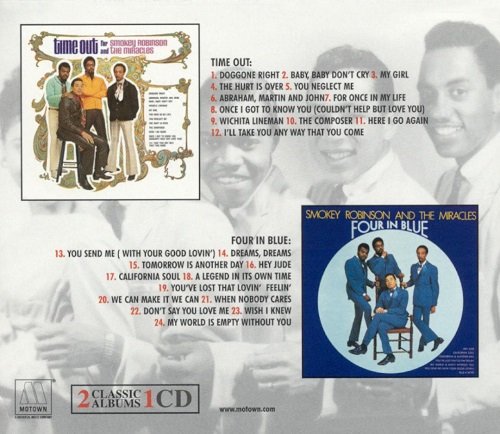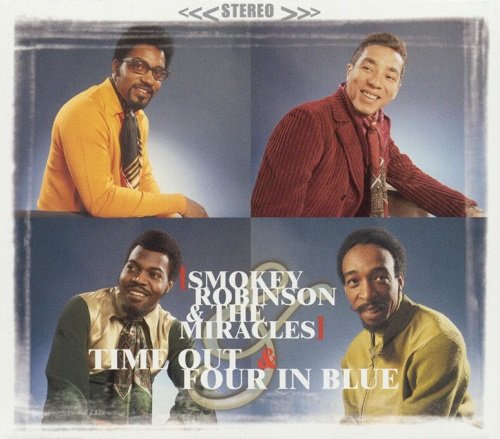
Smokey Robinson & The Miracles - Time Out & Four In Blue (Remastered) (2001)
BAND/ARTIST: Smokey Robinson & The Miracles
- Title: Time Out & Four In Blue
- Year Of Release: 2001
- Label: Motown
- Genre: R&B, Soul, Funk
- Quality: Mp3 320 / Flac (tracks)
- Total Time: 01:18:56
- Total Size: 194/533 Mb
- WebSite: Album Preview

Tracklist:
01. Doggone Right
02. Baby Baby Don't Cry
03. My Girl
04. The Hurt Is Over
05. You Neglect Me
06. Abraham Martin And John
07. For Once In My Life
08. Once I Got To Know You Couldn't Help But Love You
09. Wichita Lineman
10. The Composer
11. Here I Go Again
12. I'll Take You Any Way That You Come
13. You Send Me With Your Good Lovin'
14. Dreams Dreams
15. Tomorrow Is Another Day
16. Hey Jude
17. California Soul
18. A Legend In Its Own Time
19. You've Lost That Lovin' Feelin'
20. We Can Make It We Can
21. When Nobody Cares
22. Don't Say You Love Me
23. Wish I Knew
24. My World Is Empty Without You
Scoring over 40 hits in the R&B Top 40 charts, the Miracles started out as the Five Chimes in the mid-'50s while the members were still in high school. The Detroit vocal group consisted of William "Smokey" Robinson, Warren "Pete" Moore, Clarence "Humble" Dawson, Donald Wicker, and James "Rat" Grice. Not too long after the group formed, Wicker and Grice left and were replaced by cousins Emerson "Sonny" Rogers and Bobby Rogers, who both sang tenor, and baritonist Ronnie White was in Dawson's place. The vocal quintet then changed their name to the Matadors, and in 1956 Claudette Rogers joined the band after her brother Sonny Rogers was drafted. The Matadors auditioned for Jackie Wilson's manager, Nat Tarnapol, in 1956. Although Tarnapol wasn't interested, finding the group too similar to the Platters, Jackie Wilson's songwriter Berry Gordy Jr. was, and he soon began producing the band, who now went by the name the Miracles. Gordy produced their first single, "Get a Job," which was issued by the N.Y. label End Records in 1958.
After one more release on this label, the Miracles recorded their first song for Gordy's new Motown/Tamla label, 1959's "Bad Girl" (which was issued nationally on the Chess label). Next came the first hit for both the group and the label, 1960's "Shop Around," which reached number one on the R&B charts and number two pop. The next song by the Miracles to hit the number one R&B spot and reach the pop Top Ten came two years later with "You've Really Got a Hold on Me." Smokey and Claudette got married in 1963, and she retired from the group a year later. The band's last big hit before they changed their name from the Miracles was "Going to a Go-Go" (1966), which climbed into the Top Five on the R&B charts, and the pop Top 20. Later that year, "I'm the One You Need" reached the Top 20. After this, the group's name changed to Smokey Robinson & the Miracles and they scored two more number one songs: "I Second That Emotion" (1967) and "The Tears of a Clown" (1970).
Smokey left the group to pursue a solo career in 1972 and 20-year-old Billy Griffin was brought in to replace the lead singer. Once again the Miracles, the band scored several more hits, including "Do It Baby" and "Don't Cha Love It," which both reached the R&B Top Ten. The Miracles experienced a big success in early 1976 with "Love Machine (Part 1)," which reached number one on the pop charts. The multi-million selling single came off of their second album without Smokey, 1975's City of Angels, and stayed on the charts for over six months, making it the longest-running hit the band ever had. Their final album on the Motown label, The Power of Music, followed. After this, the Miracles added a new member, Billy Griffin's brother Don, and the band switched over to Columbia Records. Their first CBS release was Love Crazy (1977), which contained a single, "Spy for the Brotherhood," that was pulled off the record after complaints from the FBI. The group's last charting single, "Mean Machine," made the R&B Top 100 in 1978. Billy Griffin pursued a solo career, and Warren "Pete" Moore became a record producer in Detroit. In the late '80s, Bobby Rogers started the New Miracles, and in 1990 the Miracles (including Billy Griffin and Claudette Robinson) reunited to re-record "Love Machine" for the U.K. Motorcity label. Ronnie White died from leukemia in 1995 and Griffin died in 2013 from diabetes complications.
After one more release on this label, the Miracles recorded their first song for Gordy's new Motown/Tamla label, 1959's "Bad Girl" (which was issued nationally on the Chess label). Next came the first hit for both the group and the label, 1960's "Shop Around," which reached number one on the R&B charts and number two pop. The next song by the Miracles to hit the number one R&B spot and reach the pop Top Ten came two years later with "You've Really Got a Hold on Me." Smokey and Claudette got married in 1963, and she retired from the group a year later. The band's last big hit before they changed their name from the Miracles was "Going to a Go-Go" (1966), which climbed into the Top Five on the R&B charts, and the pop Top 20. Later that year, "I'm the One You Need" reached the Top 20. After this, the group's name changed to Smokey Robinson & the Miracles and they scored two more number one songs: "I Second That Emotion" (1967) and "The Tears of a Clown" (1970).
Smokey left the group to pursue a solo career in 1972 and 20-year-old Billy Griffin was brought in to replace the lead singer. Once again the Miracles, the band scored several more hits, including "Do It Baby" and "Don't Cha Love It," which both reached the R&B Top Ten. The Miracles experienced a big success in early 1976 with "Love Machine (Part 1)," which reached number one on the pop charts. The multi-million selling single came off of their second album without Smokey, 1975's City of Angels, and stayed on the charts for over six months, making it the longest-running hit the band ever had. Their final album on the Motown label, The Power of Music, followed. After this, the Miracles added a new member, Billy Griffin's brother Don, and the band switched over to Columbia Records. Their first CBS release was Love Crazy (1977), which contained a single, "Spy for the Brotherhood," that was pulled off the record after complaints from the FBI. The group's last charting single, "Mean Machine," made the R&B Top 100 in 1978. Billy Griffin pursued a solo career, and Warren "Pete" Moore became a record producer in Detroit. In the late '80s, Bobby Rogers started the New Miracles, and in 1990 the Miracles (including Billy Griffin and Claudette Robinson) reunited to re-record "Love Machine" for the U.K. Motorcity label. Ronnie White died from leukemia in 1995 and Griffin died in 2013 from diabetes complications.
Soul | Funk | Oldies | FLAC / APE | Mp3
As a ISRA.CLOUD's PREMIUM member you will have the following benefits:
- Unlimited high speed downloads
- Download directly without waiting time
- Unlimited parallel downloads
- Support for download accelerators
- No advertising
- Resume broken downloads


